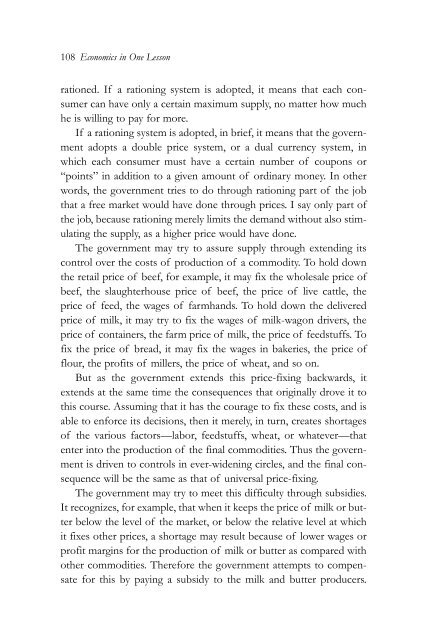1gDdM7w
1gDdM7w
1gDdM7w
- No tags were found...
You also want an ePaper? Increase the reach of your titles
YUMPU automatically turns print PDFs into web optimized ePapers that Google loves.
108 Economics in One Lessonrationed. If a rationing system is adopted, it means that each consumercan have only a certain maximum supply, no matter how muchhe is willing to pay for more.If a rationing system is adopted, in brief, it means that the governmentadopts a double price system, or a dual currency system, inwhich each consumer must have a certain number of coupons or“points” in addition to a given amount of ordinary money. In otherwords, the government tries to do through rationing part of the jobthat a free market would have done through prices. I say only part ofthe job, because rationing merely limits the demand without also stimulatingthe supply, as a higher price would have done.The government may try to assure supply through extending itscontrol over the costs of production of a commodity. To hold downthe retail price of beef, for example, it may fix the wholesale price ofbeef, the slaughterhouse price of beef, the price of live cattle, theprice of feed, the wages of farmhands. To hold down the deliveredprice of milk, it may try to fix the wages of milk-wagon drivers, theprice of containers, the farm price of milk, the price of feedstuffs. Tofix the price of bread, it may fix the wages in bakeries, the price offlour, the profits of millers, the price of wheat, and so on.But as the government extends this price-fixing backwards, itextends at the same time the consequences that originally drove it tothis course. Assuming that it has the courage to fix these costs, and isable to enforce its decisions, then it merely, in turn, creates shortagesof the various factors—labor, feedstuffs, wheat, or whatever—thatenter into the production of the final commodities. Thus the governmentis driven to controls in ever-widening circles, and the final consequencewill be the same as that of universal price-fixing.The government may try to meet this difficulty through subsidies.It recognizes, for example, that when it keeps the price of milk or butterbelow the level of the market, or below the relative level at whichit fixes other prices, a shortage may result because of lower wages orprofit margins for the production of milk or butter as compared withother commodities. Therefore the government attempts to compensatefor this by paying a subsidy to the milk and butter producers.


